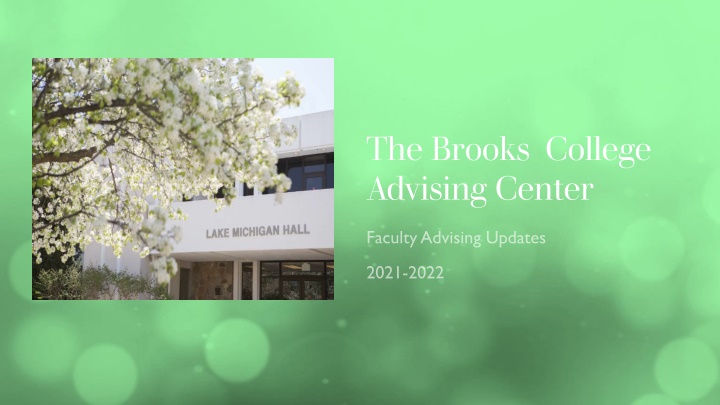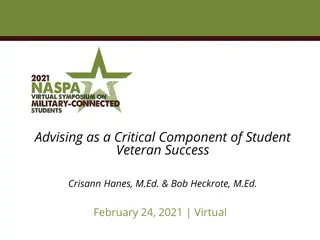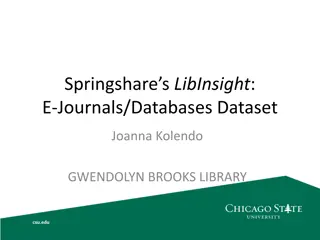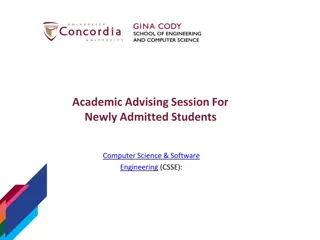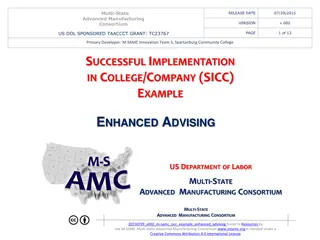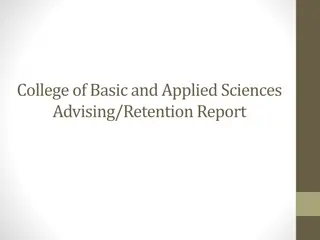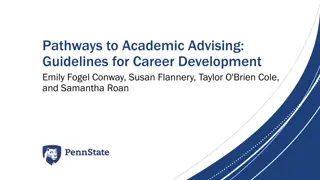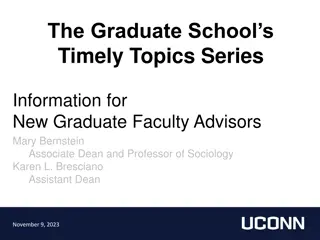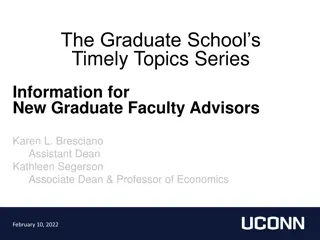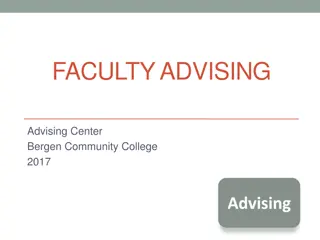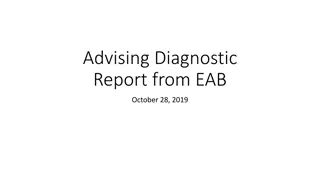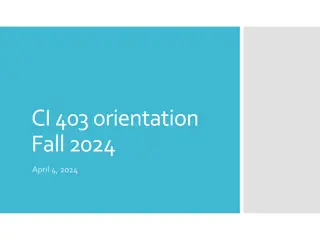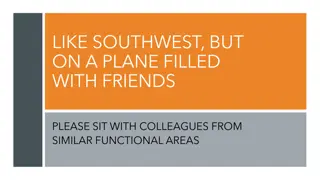Brooks College Advising Center
The Brooks College Advising Center offers both faculty and professional advising services to help students navigate their academic journey. Learn about the differences between faculty and professional advisors, how students are assigned to advisors, and the foundations of faculty advising, including advising outreach and documentation practices. Get insights into the most frequently asked advising questions and understand the 30/20 rule for major and minor credit requirements.
Download Presentation

Please find below an Image/Link to download the presentation.
The content on the website is provided AS IS for your information and personal use only. It may not be sold, licensed, or shared on other websites without obtaining consent from the author.If you encounter any issues during the download, it is possible that the publisher has removed the file from their server.
You are allowed to download the files provided on this website for personal or commercial use, subject to the condition that they are used lawfully. All files are the property of their respective owners.
The content on the website is provided AS IS for your information and personal use only. It may not be sold, licensed, or shared on other websites without obtaining consent from the author.
E N D
Presentation Transcript
The Brooks College Advising Center
Faculty vs Professional Advising Faculty advisors: Experts with in-depth knowledge in your major field Know the wide variety of careers available to majors Recommend which courses within the major will be best for you Help you effectively choose and prepare for internships, graduate programs, and careers Have professional connections in the field and can foster your professional development in your academic area of interest Professional advisors: Expertise is in how to successfully navigate through the process of getting an undergraduate degree University policies and procedures Major, minor and other graduation requirements myPath degree evaluation and transcripts University resources and co-curricular experiences available to students
Foundations of Faculty Advising Advising Outreach: Introduce/Re-introduce yourself Encourage students to meet with you at least once during the semester Provide advising hours to students and best way to reach you. If you are scheduling through Navigate, you can use a direct link to your availability in your email signature. Include information on your role and how you can support students Share your expertise as a faculty advisor Remind students of upcoming academic calendar and registration deadlines
Foundations of Faculty Advising Your advising caseload will change as students enter and leave programs. The easiest way to access current advisees and reach out to those students is in Navigate. Set clear expectations about email response time, as well as the types of questions you can answer via email (vs. questions that should be handled via phone, zoom and/or in-person meetings). Advising meetings should be documented in Navigate with Appointment Summaries (you do NOT have to schedule through Navigate to do this!) Email Advising should be documented in Navigate with Notes (Note Reason: Advising Email Discussion)
Most Frequently Asked Advising Questions The 30/20 Rule Students must have 30 unique credits in each major and 20 unique credits in each minor. For example: the ENS major requires 39 credits, so 9 credits can be double dipped with a minor. The number of credits above 30 is the number you can double dip. There are no limits on double dipping with Gen Eds or certificates. If a student has a major of 30 credits they cannot double dip classes with a minor. MyPath will calculate the double dip automatically for majors other than INT/LIB. If in doubt, an auditor can help clarify number of credits available for double dipping
Most Frequently Asked Advising Questions Remember 120, 58 and 30 Students must complete a minimum of 120 credits, 58 of which need to be at a 4-year school, and the last 30 must be taken at GVSU (Residency Rule). These three categories appear at the top of myPath for quick reference. There are exceptions to the Residency Rule. Students should fill out the residency request form on the Registrar s forms page and submit to the Student Academic Success Center. Decisions are made on a weekly basis. Residency waivers can be requested retroactively. Students on study abroad are still registered for GV credits, so study abroad in the last 30 is not an issue.
Most Frequently Asked Advising Questions Repeating a Course Be careful of students who are repeating a course they previously passed. BOTH the current and older course will be counted in MyPath until the repeat course is complete. When meeting with students, check to make sure you re not counting those additional credits in the overall total. If students are repeating a course more than once, they need a repeat limit form. Advisor approval is required for courses in the major. Unit head approval is also required for courses outside the major. For ex, if an INT major is taking STA 215 for the 3rdtime, they need advisor approval AND the approval of the STA unit head.
Most Frequently Asked Advising Questions Good Academic Standing = 2.0 or higher 3 levels below 2.0: Academic Probation, Jeopardy of Dismissal, and Dismissal. If cumulative GPA drops below 2.0 students are placed on either probation or JD, depending on the number of credits and overall GPA. AP JD Dismissal Students on AP or JD need advisor approval to register Students need to return to cumulative GPA of 2.0 or achieve semester GPA of 2.5 the following semester. If a student is dismissed, they will need to apply for re-admission through the petition to return process. This includes meeting with an advisor to discuss plans to return and a potential schedule towards completing graduation requirements.
Add/Drop, Withdrawal Policies Tuition payment deadline is August 20 for Fall 2021. Students who do not make payment are dropped from all their classes (ZICK) and must pay tuition or make arrangements with Student Accounts in order to re-register for their classes. Add/Drop Week: During the first week of classes, students may add/drop courses freely in Banner with 100% refund. Late Drop with a W: After the first week of classes, students can drop with a W grade until the W deadline (October 29 for Fall 2021). Tuition refund drops to 75% until September 24, then to no refund. Dropping a class may affect scholarship or financial aid eligibility or Satisfactory Academic Progress. Always encourage students to talk with Financial Aid before dropping with a W. Late Add: If a student wants to add a course after the first week of classes, they will typically need approval (signatures on paper or electronic) from instructor, unit head, and dean s office. There is a $25 late add fee.
Academic Appeal Options Incomplete Late W: If a student wants to drop a single class after the W deadline, they can complete a Late Withdrawal request. Student needs approval from instructor and unit head and letter of support from instructor or unit head (Reviewed by Academic Review Committee) TRAC Appeal: If a student is withdrawing for extenuating circumstances they can file a Tuition Refund Appeal (TRAC) which includes a request for a complete withdrawal (Reviewed by TRAC Committee) Retroactive Withdrawal: When a student fails because they didn t request W grades, it s possible to request a retroactive W in a subsequent semester (Reviewed by Academic Review Committee) Academic Forgiveness: Removes low/failing grades from previous major from GV GPA (Application must be done by professional advisor)
Degree Audits and Graduation Auditors are responsible for degree audits and making changes to records (MyPath, etc). They are assigned to work with specific students, according to alphabet. You can contact the Registrars office for the name of the auditor or email audit@gvsu.edu and include student last name in subject line In order to graduate, students need to complete the graduation application in a timely manner. Ideally, this should be done the semester prior to the expected graduation date. You should do an audit review with the student the semester BEFORE they graduate if possible. Brooks professional advisors cannot complete graduation audits, but we can help answer questions about why a student received a no letter and identify possible subs or other solutions
Advising Resources LAAN: Laker Academic Advising Network promotes collaboration and shared professional development across all colleges and advising centers at GVSU Committees on Mentorship, Standards, Technology, TSAR and Training and Development coordinate and streamline projects, recommendations, and responses to university-wide advising policy and procedures LAAN offers multiple professional development opportunities throughout the year Upcoming PD will focus on study abroad opportunities and advising students who are interested in study abroad Faculty and staff can join LAAN to participate in professional development and receive updates on LAAN committee work and other advising topics
Contact Us The Brooks College Advising Center We are located in Lake Michigan Hall, on the Allendale Campus, in Room 260 Phone: 616-331-8200 Email: brooksadvising@gvsu.edu Website: www.gvsu.edu/brooksadvising Help students schedule appointments with us by using Navigate!
